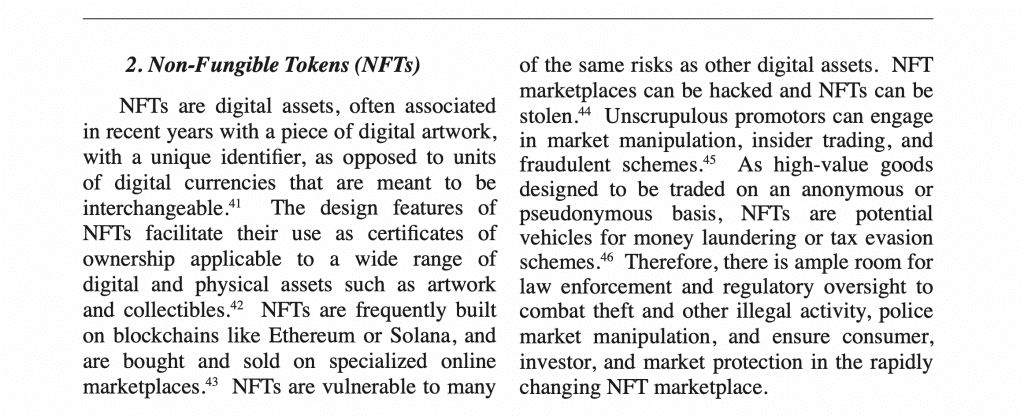The White House released its “First-Ever Comprehensive Framework for Responsible Development of Digital Assets” on Friday, saying that “millions of people globally, including 16 percent of adult Americans, have purchased digital assets” – from cryptocurrencies to non-fungible tokens, putting a value of $3 trillion on the global market for digital assets as of November 2021. Setting the stage in its release, the Biden Administration states that while “digital assets present potential opportunities to reinforce U.S. leadership in the global financial system and remain at the technological frontier, they also pose real risks as evidenced by recent events in crypto markets,” including the May crash of “a so-called stablecoin and the subsequent wave of insolvencies wiped out over $600 billion of investor and consumer funds.”
In the wake of the release of President Biden March 2022 digital asset-focused Executive Order (“EO”), which outlined “the first whole-of-government approach to addressing the risks and harnessing the potential benefits of digital assets and their underlying technology,” the White House says that relevant government agencies have worked together to develop frameworks and policy recommendations that advance the six key priorities identified in the EO, namely, “consumer and investor protection; promoting financial stability; countering illicit finance; U.S. leadership in the global financial system and economic competitiveness; financial inclusion; and responsible innovation.”
Together, the resulting nine reports that have been submitted to President Biden “articulate a clear framework for responsible digital asset development and pave the way for further action at home and abroad,” the White House asserted on Friday.
The reports consist of: (1) the U.S. Department of Commerce’s report, Responsible Advancement of U.S. Competitiveness in Digital Assets; (2) the White House Office of Science and Technology Policy’s report, Climate and Energy Implications of Crypto-Assets in the United States; (3) another from the White House Office of Science and Technology Policy, entitled, Technical Evaluation for a U.S. Central Bank Digital Currency System; (4) the Department of Justice’s report, The Role of Law Enforcement in Detecting, Investigating, and Prosecuting Criminal Activity Related to Digital Assets; (5) Department of the Treasury’s report, The Future of Money and Payments; (6) the Department of the Treasury report, Crypto-Assets: Implications for Consumers, Investors, and Businesses; (7) another from the Department of the Treasury, entitled, Action Plan to Address Illicit Financing Risks of Digital Assets.
From a risk standpoint, such reports reveal that “sellers commonly mislead consumers about digital assets’ features and expected returns, and non-compliance with applicable laws and regulations remains widespread.” In fact, one study found that “almost a quarter of digital coin offerings had disclosure or transparency problems—like plagiarized documents or false promises of guaranteed returns.” At the same time, the White House contends that “outright fraud, scams, and theft in digital asset markets are on the rise: according to FBI statistics, reported monetary losses from digital asset scams were nearly 600 percent higher in 2021 than the year before.”
Against that background, and “as outlined in the reports released today,” the White House is calling on the Consumer Financial Protection Bureau and the Federal Trade Commission (“FTC”) “as appropriate, to redouble their efforts to monitor consumer complaints and to enforce against unfair, deceptive, or abusive practices,” among other things. Moreover, the reports “encourage agencies to issue guidance and rules to address current and emergent risks in the digital asset ecosystem,” which seems to fall neatly in line with the call by the FTC, for example, for public comment on ways to modernize the guidance to align it with new advances in technology – including virtual reality (“VR”), augmented reality (“AR”), gaming, the metaverse, etc. – and how advertisers now interact with consumers. This comes in light of the agency’s plans to revise its digital advertising guide to include new guidance that may take the metaverse/virtual reality into consideration.
Attention to NFTs
While the bulk of the White House’s release centers on financial risks that come with widespread embrace of digital assets, such as cryptocurrencies, it does make specific – albeit brief – mention of NFTs, stating that the President “will evaluate whether to call upon Congress to amend the Bank Secrecy Act, anti-tip-off statutes, and laws against unlicensed money transmitting to apply explicitly to digital asset service providers—including digital asset exchanges and non-fungible token platforms.” The individual reports, on the other hand, pay a fair amount of attention to NFTs …
The Department of Justice’s report dives into this type of token, as well as the applicability of the Bank Secrecy Act to NFT platforms, like OpenSea, given that such platforms “may take the view that this definition does not apply to their activities—and that they are thus not subject to the BSA’s Anti-Money Laundering/Combating the Financing of Terrorism requirements.”

The Department of Commerce’s report states that “in just over a decade, digital assets have emerged as a factor in political, economic, social, and cultural discourse about the future of financial services. Terms such as crypto-asset, digital dollar, and NFT are now prominent in everyday discussion on personal finances and many Americans are increasingly asking whether digital assets should have a place in their portfolios.” The agency sates that “NFTs and smart contract implementations may also offer innovations in product and intellectual property verification,” and notes that “there are outstanding legal questions regarding the purported intellectual property, copyright, trademark rights of NFTs.”
The Department of the Treasury’s “Crypto-Assets” report pays significant attention to NFTs, stating, among other things, “NFTs purport to represent a claim or receipt on an asset or object that has inherently unique characteristics or that differs from similar assets in some distinguishable way. Although NFTs are tradeable, they are not interchangeable.” Proponents of NFTs claim they have “many potential applications, such as representations of collectible items (for example, art or music), digital goods, individual identification credentials, access keys, property deeds or titles, or tickets for travel or events.” However, the Treasury report cautions that “the legal rights afforded by NFTs are unclear and have been subject to litigation.”
Among the issues with NFTs, according to the agency, are “disclosure and integrity gaps, where, for example, consumers can unknowingly buy NFTs that may contain infringements,” with the agency pointing to the Hermès v. Rothschild case. “The industry has seen a significant increase in the number of lawsuits filed,” it notes, “with claims related to deceitful marketing tactics or for sales made under false pretenses.”











